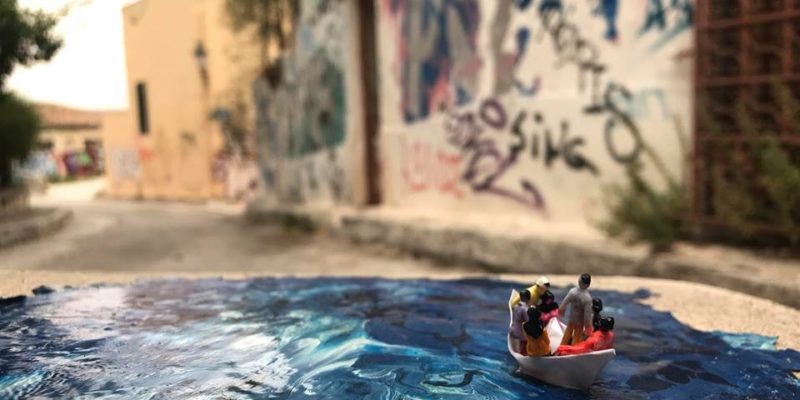1. Niger sends 132 Sudanese refugees back to Libya
The UNHCR has resumed the evacuation programme from Libya after a two-month suspension, also using charter flights. Meanwhile, Niger, a key partner for Italy and the EU, has sent 132 Sudanese refugees back to Libya. Read the exclusive report by Irin News, after negotiations to keep the refugees in Niger fell through. According to Nigerian authorities, who arrested them in Agadez on May 2, the refugees were part of a militia operating in Southern Libya. For a better understanding of the situation in Niger and the impact of the fragile agreements for the externalisation of European borders, read our three-part special by Giacomo Zandonini (part I, part II, and part III).
2. A new report by Forensic Architecture supports a migrants’ lawsuit against Italy
A lawsuit against Italy was filed this week in Rome in the European Court of Human Rights by 17 survivors of the shipwreck of November 6, 2017, where at least 20 people died following a confrontation between the Libyan Coast Guard and the rescue NGO Sea Watch. A new video reconstruction of the incident by Forensic Architecture supports the survivors’ accounts. Read a summary in Italian, Annalisa Camilli’s report for Internazionale, as well as our own report).
3. October 3 shipwreck: DNA says man in custody is not the “real” Mered
A DNA test on the son of Mered – a three-year-old child who lives with his mother in Sweden – shows that Medhanie Tesfamariam Behre, the man who is being tried in Palermo is not the infamous people smuggler who is responsible for the 2013 Lampedusa migrant shipwreck: Lorenzo Tondo, who has been writing about the case for some time, announced it this week in the Guardian. We told everything about this case of mistaken identity in this article by Lorenzo Bagnoli; the “real” Mered is probably a fugitive and was seen in several cities since the incarceration of Behre.
4. The 105 migrants rescued by the Astral have arrived safely in Catania after 5 days
After the odyssey of last weekend, the Aquarius of SOS Méditerranée docked in Catania on Tuesday with the 105 people transferred from the smaller boat Astral that had rescued them on Sunday, and had to wait 36 hours for permission to disembark.
The Aquarius had to wait till late afternoon on Tuesday for the assignation of a safe port, SOS Méditerranée wrote in a press release.
5. Humanitarian aid and crimes of solidarity: three Spanish firemen cleared of charges
Three years ago, volunteers and aid organisations mobilised to help refugees. Today, refugees themselves are the very soul of grassroots solidarity, Dana Sachs wrote in News Deeply. Some among the first volunteers to arrive in Greece had been charged with facilitating illegal immigration. Now the charges against the three Spanish firemen – Manuel Blanco, José Enrique Rodríguez and Julio Latorre – have been finally dropped. Benoît Ducos, the Alpine guide accused of helping a pregnant woman in the mountains, has received the “Mediterraneo di Pace” award. Meanwhile, R@inbow for Africa, which is very active on the French border, has gathered European mayors and representative to show a front of understanding and solidarity.
6. Racist reactions to Jennifer, who had been wounded in Macerata
The first hearing was held last week in the trial of Luca Traini, who shot and wounded 8 people in Macerata on February 3. Among the the more severely injured was Jennifer, a 25-year-old Nigerian woman who has brought suit as a civil party. Sebastian Bendinelli wrote in The Submarine about the racist reactions to her claim for compensation. Another of the wounded, Kofi Wilson, had told us in Macerata about his friendship with Jennifer.
7. From the US to Europe, there is no end to violence against migrants
Since 2010, more than 1,200 migrants have been victims of sexual violence in the USA at the hands of Immigration and Customs Enforcement agents, The Intercept has revealed: the data point to more than 33,000 complaints of abuse in immigrant detention between January 2010 and July 2016. The situation is not much better in Europe: from cruelty at the hands of Hungarian border officers (dog bites included), to sexual violence in Greek camps, the list of abuse against refugees gets longer and longer. Even Italy is not immune to these accusations, despite silence from the authorities. Read the article by Luigi Mastrodonato in The Vision.
8. Restrictions to data access in Britain might affect migrants
The aftermath of the Windrush scandal is sparking new fears for the immigrant population in the UK. Changes in the legislation on data protection was discussed last Wednesday in Parliament. According to some groups, such changes would prevent anyone seeking information about their immigration status in the future. There have been thousands of subject access requests in recent years, which leads many to fear heavy consequences for the immigrant population.
9. Migrants take a new Balkan route through Bosnia
Over the last few years, thousands of men, women and children have crossed the Balkans in the attempt to reach Europe. Walls, barriers, authoritarian responses by governments (you can read our reports from Hungary and Serbia) and the EU-Turkey deal have led many of them to seek new and less frequented routes. Relatively easy passage along unmonitored borders is driving more and more migrants towards Bosnia and Herzegovina. The country is still unprepared to manage a potential emergency, wrote Osservatorio Balcani e Caucaso.
10. The right to reside: a practical toolkit for migrants
The LasciateCiEntrare campaign has created a toolkit for the residence and registration processes. Everyone who has been living in Italy for some time has a right to reside, but often, because of arbitrary discrimination, this right is not granted to foreigners and asylum seekers.
Foto di copertina di Alexander Jaschik









